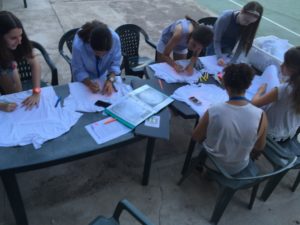 This story about student volunteering appeared recently in the Education Review.
This story about student volunteering appeared recently in the Education Review.
VOLUNTEERING AS A STUDENT CAN ENHANCE YOUR EMPLOYABILITY
New Zealand universities are encouraging students to volunteer in their communities as a way to develop their leadership skills and increase their chances of employment, says HANNAH AMANTE.
A structured but flexible approach
Victoria University in Wellington offers the Victoria Plus Programme to all students enrolled in a degree or postgraduate qualification. The programme enables students giving back to their community to earn points towards a Victoria Plus Certificate, Victoria Plus Award or both.
Both achievement levels include three main components: extracurricular activities (which includes volunteering), personal and professional development workshops and a reflective component called the ePortfolio.
Jane Fletcher is the Assistant Manager, Careers and Employment and was responsible for helping develop the program ten years ago.
“Students enjoy having a structure to work to,” she said. “It helps them connect the dots between their experiences and their employability skills.”
Volunteer activities, as well as participation in the other components, are logged into a system so students can track their progress to see how well they’re doing. Completion of the Victoria Plus Programme is formally acknowledged on students’ academic transcripts.
Students are encouraged to find opportunities that suit their interests and career goals. Some of the community organisations suggested on the programme’s website include Wellington SPCA, Wellington Riding for the Disabled and New Zealand Red Cross. Students are also encouraged to connect with Volunteer Wellington to discover a range of opportuntiies.
Other universities also seek to recognise its student volunteers. The University of Otago Student Leadership Award is a two-year pathway open to students from any academic discipline. According to the University Volunteer Centre (UVC) website, one component to the award includes completing “at least 170 hours of voluntary leadership and service activities.”
The Lincoln University Future Leader Scholarship includes the opportunity to lead groups in community projects.
Connecting to the community around you
Universities often have a close relationship with their regional volunteer centres.
The University of Otago connects community organisations with students looking to give back through the UVC. Volunteer co-ordinator Sze-En Watts said the UVC helps create positive relationships between the university and the community.
The UVC and Volunteering Otago share networks and databases of volunteer opportunities and contacts in Dunedin. Students can choose from a list and then have a one on one meeting with UVC staff to see which roles might fit. According to Watts, some opportunities are based online and some are through a national organisation but there is a particularly strong focus on local opportunities.
“In a city the size of Dunedin, it is especially important to have those good relationships between ‘town and gown,’ as they say,” she said.
Through UVC, students can register as a UniCrew volunteer. UniCrew Projects are student-led initiatives that are developed in partnership with a community organisation. According to the UniCrew homepage, students can choose from 164 community organisations.
Richard Brewster, Strategy and Finance Manager at Volunteering Canterbury, says that 19% of volunteers in the region identified themselves as students.
For National Student Volunteer Week last year, Volunteering Canterbury encouraged not for profit organisations (NFPs) to set up stalls on the University of Canterbury campus. Brewster said it was effective way to get students to realise which NFPs were active in the region.
The Student Volunteer Army (SVA) in Canterbury was founded after the September 2010 earthquake when over 11,000 students became involved in the cleaning up the city. According to the University of Canterbury’s website, the SVA is the university’s largest student club at over 2,000 members and participates in community projects every weekend.
Employers care that you care
Brewster, previously a manager in the corporate world, believes that volunteering truly makes a difference from a recruitment perspective.
“If someone had the same qualifications as you but had some activity in the community, it shows they’re a nice person. Managers want to work with nice people,” he said.
Fletcher also thinks the reverse is true – people looking for a job want to work with responsible companies and recruiters want to prove their values to them.
“Employers care [about your volunteer work] because they also are a part of the community and so are their employees,” Fletcher said. “They also understand that people applying for their organisation want to know about these things – what is their vision, what is their mission in terms of social responsibility. How ethical is that employer? How do their values align with the person who’s applying?”
Personal happiness
Brewster wants students to know that outside of gaining employability skills, volunteering contributes to personal satisfaction. “Volunteering makes people happy,” he said. “There’s been scientific research on that. It’s gonna make you a more balanced individual and give you a more balanced life.”
“If you plan things accordingly, you can get a break through your volunteering,” Fletcher said. “It doesn’t always have to be seen as work; it can become a permanent interest as well. A lot of students find that volunteering is a relief [from academia] and is good for their wellbeing.”
New ways of engagement
As technology continues to shape the world around us, students can find more innovative ways to connect with their communities.
According to Watts, “some [opportunities] are purely online, and you never meet the community that you’re a part of face to face but you engage through the internet.” Watts believes that students and young people are doing well in terms of leading those new ways.
For more information
If you’re keen to lend a hand and develop transferable skills, check out your regional volunteer centre or your student services on campus to see what volunteer opportunities are available as part of a structured programme or on your own terms.
Student Volunteer Week 2017: Student Volunteer Week from 1-7 May is a campaign organised every year by Volunteering New Zealand. You can follow Student Volunteer Week at www.studentvolunteerweek.nz or by using the hashtag #SVW2017.




About The Author: Admin
More posts by admin